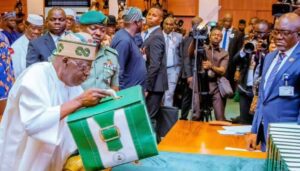
Tribunal contest: Tinubu objects to petition for run-off election, says Atiku is a ‘serial loser’
…Says prayer ungrantable
…He lost most of his supporters while crisscrossing, divided his party — President-elect says
By Moses Adeniyi
As the legal contest challenging his declaration as the winner of the February 25 presidential election rolls up, President-elect, Asiwaju Bola Tinubu, has described the petition for a run-off of the presidential polls as ungrantable, knocking his closest rival, the candidate of the Peoples Democratic Party (PDP), Atiku Abubakar a serial loser who has been losing since the return to democracy in 1993.
The President-elect in response to the petition filed by the PDP, and its candidate, Atiku before the Presidential Election Petition Tribunal Court (PEPC) seeking to nullify his election, said given Atiku’s antecedents of losing elections successively, it should not be a surprise, nor an accident that the electorate again rejected him at the polls on 25th February, 2023.
Tinubu, in a preliminary objection he entered before the PEPC, in Abuja, described the PDP candidate as a consistent loser that had since 1993, crisscrossed different political parties, in search of power.
He noted in the process he filed through his team of lawyers led by Chief Wole Olanipekun, SAN, that in the process of crisscrossing from one party to another, Atiku lost most of his followers.
He said he would during the hearing of the petition, lead evidence before the court to show how Atiku’s emergence as a candidate in the presidential election that held on February 25, led to the “balkanisation” of the opposition PDP.
“The 1st petitioner (Atiku) has been consistently contesting and losing successive presidential elections in Nigeria since 1993, whether at the party primary election level or at the general election; including 1993, when he lost the Social Democratic Party (SDP) primary election to the late Chief M.K.O Abiola; 2007, when he lost the presidential election to the late President Umaru Musa Yar’Adua; 2011, when he lost the Peoples Democratic Party presidential primary election to President Goodluck Jonathan; 2015, when he lost the APC primary election to President Muhammadu Buhari; 2019, when he lost the presidential election to President Muhammadu Buhari; and now, 2023, when he has again, lost the presidential election to the respondent.
“Further to (iv) supra, it was/is not a surprise and/or not by accident that the electorate rejected the 1st petitioner at the polls of the presidential election held on 25th February, 2023,” he said in his objection.
Tinubu who insisted that he was validly returned as winner of the presidential election by the Independent National Electoral Commission (INEC) argued before the court that unlike Atiku, he has been “a most consistent politician, who has not shifted political tendency and alignment.”
“The 1st petitioner (Atiku) has consistently crisscrossed different political parties of Nigeria, including being a member of the PDP, before joining the Action Congress in 2007, when he was the presidential candidate of the party; returned to the PDP thereafter, before joining the 3rd respondent in 2015, where he contested the primary election with President Muhammadu Buhari, before returning to the PDP in 2019 to emerge as its presidential candidate.
“Arising from paragraph 9 supra, while the respondent has always carried his supporters along and increased his political followership, the 1st petitioner has lost most of his followers in the process of moving from one political party to the other.
“The emergence of the 1st petitioner as the presidential candidate of the 2nd petitioner led to irreconcilable hostilities within the ranks of the 2nd petitioner, causing the emergence of a group of Governors known all over the country as the G-5 Governors- Rivers, Oyo, Enugu, Abia and Benue, who opposed the 1st petitioner and vowed to mobilise their people against him.
“The respondent shall at the trial, found and rely on copies of newspaper publications and social media contents in respect of the said subject,” he noted.
He further argued that while the 1st petitioner contested the presidential election of 2019 with President Muhammadu Buhari under a fairly cohesive Peoples Democratic Party with Peter Gregory Obi as his running mate and Rabiu Musa Kwankwaso as one of his supporters, the same Obi broke away from the PDP to join the Labour Party to contest the presidential election of 25th February, 2023, while Kwankwaso also broke away from PDP to contest the presidential election on the ticket of the New Nigeria People’s Party.
“While Peter Obi polled a total number of 6,101,533, Rabiu Musa Kwankwaso polled 1,496,687.
“Before the balkanisation of the 2nd petitioner, the South-Eastern States of Enugu, Abia, Imo, Ebonyi and Anambra used to be controlled by the 2nd petitioner, but at the presidential election of 25th February, 2023, they all went the way of Labour Party,” he argued.
Tinubu mentioned that his party, the All Progressives Congress (APC), is a national party, popular amongst Nigerians, cutting across all divides, arguing that the PDP, on the other hand, had in recent years, “been engrossed in intra-party irreconcilable feuds and infighting, both in relation to its national offices and officers, as well as the Convention which produced the 1st petitioner as its presidential candidate.”
“Presently (and/or) from 2015 till date, the 3rd respondent has been the political party in power in Nigeria; it presently has the President of the country, 20 State Governors, 64 Senators, 217 members of the House of Representatives and about 600 members of the States’ Houses of Assembly, nationwide; while the 2nd petitioner has just 14 State Governors, 39 Senators and 111 Members of the House of Representatives.
“In the election that held on 25th February, 2023 and 18th March, 2023, while the 3rd respondent produced 15 Governors, as against 9 of the 2nd petitioner, it also produced 64 Senators, as against 33 produced by the 2nd petitioner, and 217 Representatives, as against 104 produced by the 2nd petitioner.
“The respondent will lead evidence to prove and demonstrate that from 1999 till date, it has been the consistent pattern that the political party who controlled/controls most of the States as well as the National and State Assemblies produced/produce the President, and that the election of 25th February, 2023 was no exception.
“This is asides the misfortune and calamities that have befallen the 2nd petitioner in recent years, even till after the election, where they had to sack their National Chairman. The respondent shall found and rely on documents and newspaper reports of the various squabbles in the 2nd petitioner.
“In reaction to paragraphs 3 and 4 of the petition, the respondent asserts that the 2nd petitioner has lost its relevance and popularity within its own ranks and amongst Nigerians leading to abysmal electoral performance.
“Therefore, at the National Assembly election conducted on the same day as the 2023 presidential election, the 2nd petitioner only won thirty-three (33) out of the One Hundred and Nine (109) Senatorial seats and about 100 out of the Three Hundred and Sixty (360) seats in the House of Representatives.
“Further to 21 above, the fortune of the 2nd petitioner has also dwindled with regard to the number of governors produced by it.
“In the 2023 election cycle, the said 2nd petitioner was only able to win 9 governorship seats. The 2nd petitioner’s electoral reputation is contrary to that of the 3rd respondent which has, in the past three election cycles in Nigeria, apart from winning the presidential elections also maintained an emphatic majority in both chambers of the National Assembly as well as a majority of states across Nigeria,” he argued.
Tinubu told the court that though Atiku raised allegations against election results from States that were won by both Obi of the LP, and Kwankwaso of the NNPP, he however failed to join them as necessary and desirable parties in the petition.
“Without prejudice to paragraph (v) supra, the petitioners (Atiku and PDP) are also querying the result of elections in all the States where they won the election, including but not limited to Adamawa, Bauchi, Akwa-Ibom, Bayelsa, Gombe, Yobe, Sokoto, Osun, Kebbi and Katsina States, without making themselves co-respondents to the petition; whereas, under section 133(2) of the Electoral Act, 2022, a party whose election is being challenged shall be made a respondent,” Tinubu argued.
He further argued that the petition constituted a gross abuse of the judicial process, noting that six PDP controlled States had three days after the presidential election, filed a suit before the Supreme Court to nullify the outcome.
He alleged that Atiku sponsored the suit before the apex court which had among other things, accused INEC of sidelining its Regulations and Guidelines for the Conduct of Elections, 2022, by its failure to use the Bimodal Voter Accreditation System (BVAS) to electronically transmit election results.
“The petitioners herein, through themselves and/or their proxies filed the Originating Summons at the Supreme Court, before filing this petition.
“The petitioners are maintaining two processes in respect of the same subject and/or complaint of theirs, against the conduct of the presidential election held on 25th February, 2023.
“This latter petition is abusive of the Originating Summons filed at the Supreme Court and is liable to be dismissed in limine,” he argued.
On the claim that he did not secure the statutory vote from the Federal Capital Territory, FCT, Abuja, Tinubu argued that it was not a mandatory requirement of the law that he must win the FCT before he would be declared as the President-elect.
He said Atiku’s call for his election to be nullified on the ground that he was mandatorily required to score one-quarter of the lawful votes cast in each of at least two-thirds of all the States and the FCT, “becomes suspect and abusive, when considered vis-à-vis relief 150(d), where the petitioners pray that the 1st petitioner who did not score one-quarter of the votes cast in more than 21 States and the FCT, Abuja, be declared the winner of the election and sworn in as the duly elected President of Nigeria.”
He described as ungrantable, Atiku’s alternative prayer for the INEC to be directed to conduct a second election (run-off) between two of them, noting that the request was not premised on any predicate declaratory relief.
“The further alternative relief 150 (f), which reads thus: ‘that the election to the office of President of Nigeria held on 25th February, 2023 be nullified and a fresh (re-run) ordered’ is ungrantable, as:
“This Honourable Court has no jurisdiction, whether under the Constitution or the Electoral Act.
“The court can only order a run-off election, between the candidate declared as winner and the first runner-up, in appropriate cases (not in a case like the election of 25th February, 2023) as provided for under section 134 (3) of the Constitution. The said relief is at large,” he said.
Having laid his objection, he prayed the court to not only strike out paragraphs 19 to 150 of the petition for being “nebulous, inchoate, imprecise, incompetent, generic and vague”, but to dismiss the entire case for failure of the petitioners to establish a reasonable cause of action against his election victory.
“Shorn of all hype, hyperbole, grandstanding and frivolities, the petition has no substance in fact, logic and law, as well as disclosing no reasonable cause of action. It deserves to be summarily dismissed, as same constitutes a crass abuse of the judicial process,” Tinubu objected before the court.
Recall Atiku came second on the Feb. 25 presidential election, while Obi of the LP came third in the polls, but both have filed their petition seeking the court to nullify the declaration of the Tinubu as winner and President-elect
Tinubu has earlier in response to Obi’s petition argued before the PEPTC that
Recall that the the APC had earlier in defending the eligibility and victory of Tinubu argued before the PEPC that the forfeiture of the sum of $460,000 by Tinubu, its candidate in the February 25 presidential election, to the government of the United States of America (USA) in 1993 was not sufficient ground to disqualify him from contesting the election.
The forfeiture of the said sum has formed one, among other grounds in the cases filed by opposition candidates and their parties petitioned against Tinubu for which they argued he should be considered ineligible for the presidential contest.
The ruling party, however, in processes it filed to defend the outcome of the presidential election which its candidate won, maintained that Tinubu, merely surrendered funds in 10 bank accounts that were opened in either his name or that of Compass Finance and Investment Co.
It argued before the PEPC sitting at the Court of Appeal in Abuja, that funds in the said accounts, which were domiciled in both First Heritage Bank and Citi Bank N. A, were subject to a civil forfeiture proceeding in Case No: 93C4483.
The APC stated that the purported decision of the United State District Court Northern District of Illinois, Eastern division in the said case, was not a fine but a decree of forfeiture of the amount of $460,000 to the United States pursuant to the settlement of claim by the parties to the case.
“The said decision is not against the 2nd Respondent (Tinubu) but against the funds in the various account opened in the name of Bola Tinubu with First Heritage Bank and City Bank N.A.
“The compromise terms that led to the forfeiture were preceded by express admission on record that the 2nd Respondent did not admit the commission of any drug, drug-related or illicit conduct of dishonesty or fraud that fits into any of the grounds of disqualification to contest for office of president of Nigeria at the 25th February, 2023 general election,” the APC argued.
While praying the court to strike out petitions against Tinubu, the APC argued that Mr. Peter Obi, the presidential candidate of the Labour Party (LP), who alleged that Tinubu was convicted for a drug-related case, lacked the requisite locus standi to challenge the outcome of the presidential election.
It argued on the ground that Obi was not validly nominated by the LP, stressing that he was not a member of the party, at least 30 days before it conducted its presidential primary election.
It told the court that Obi was a member of the Peoples Democratic Party (PDP), till May 24 2022, adding that he was screened as a presidential aspirant of the party in April, 2022.
APC further averred that whereas Obi joined the LP on May 27, he was subsequently declared the winner of the presidential primary election the LP held on May 30, 2022.
“By section 77(3) of the Electoral Act, 2022, the 2nd Petitioner (LP) is mandated to have submitted its comprehensive register of members to the 1st Respondent 30 days before its presidential primary.
“That is to say the said register of members must have been submitted to the 1st Respondent on or before 30th April, 2022.
“The 1st Petitioner (Obi) as at 30th April, 2022 was still a member of the PDP and his name was not and could not have been in the register of members submitted by the 2nd Petitioner to 1st Respondent (INEC).
“The Petition herein is incompetent as the 1st Petitioner is not a member of the 2nd Petitioner since the 1st Petitioner’s name is not, and could have been listed in the list of the register made available by the 2nd Petitioner to the 1st Respondent, same having been made available before the 1st Petitioner joined the 2nd Petitioner,” it argued.
It, therefore, prayed the court to dismiss or strike out Obi’s petition “wholly or in part as may be approppriate.”



